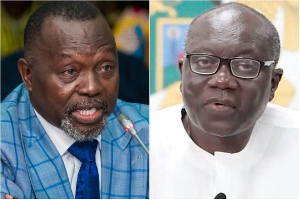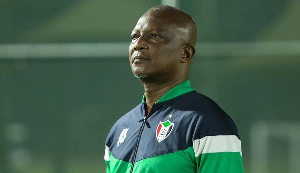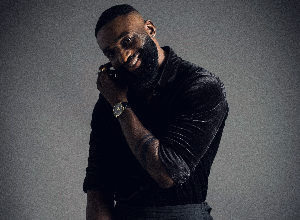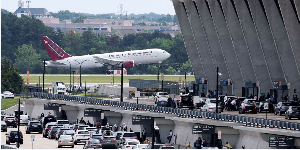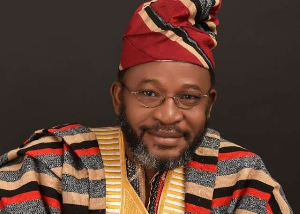I have listened to commentators from different political divides(especially NPP/NDC) trying to tell the story of our land with some level of bias to favor their stands and the heroes they will prefer to hail. But the truth is that the struggle for Ghana's indepence was pushed by a whole legion of forces made up of brave and selfless Ghanaians all over the country. So many that the names cannot be remembered. Some of them remained the unsounded heroes whilst a few on the frontline were singled out and praised. When our History is read you will hardly hear of Nii Kwabena Bonne III, the Ga Chief who organise the first boycott on the importation of foreign goods into Ghana. You won't even hear that the Anglo people gave the British one of the strongest resistance in 1874 just after the "Segranti War" which was fought by the Asantis. People who often refer to our Anglo brothers as Togolese should learn from here that they were with us even in those days of our struggle for independence. The Anglos are as indegenuous Ghanaians as anyone else.
The veterant sodiers who had witnessed simillar struggles in Burma and India were the ones who infact brought us the hope that we can also fight our way out of colonialism, but who mentions of them? When Superintendent Imray opened fire on the unarmed soldiers at the Christiansborg crossroad killing Sergeant Adjetey, Private Odartey Lamptey and Corporal Attipoe dead it was for the freedom of The then Goldcoast. Dr Kwame Nkrumah was the tip of the crown at independence but our history tells us that the campaign for him to win his first elections as prime Minister was done for him whilst he was still in jail. Some Ghanaians went out to let the people hear of him whilst he was in prison and he won that election with a National Assembly representation of 76 out of 104.
Every single step that led to our independence need to be appreciated and noted in deep writings. Before Nkrumah was invited and persuaded by his friend, Padmore to respond positively to the call, Ebenezer Ako-Adjei, Edward Akufo-Addo, Dr J. B. Danquah, Emmanuel Obetsebi-Lamptey, William Ofori Attah had founded the UGCC and were already into the battle to liberate Ghana the then Gold coast. Nkrumah after being made the secretary opted for a self indepence on a more radical manner. This brought about the Seflf "Governance Now" and the Self "Governance in the shortest possible Time" of the CPP and the UGCC respectively. The animosity between the two divides was worsened when the fold of the Founders of the UGCC found out Nkrumah had no plans for democracy but wanted to be a live president. Just follow the History bellow and diggest the history of your land in detail. We should understand that our history cannot be politicized and none of our heroes need to be sidelined or pressed low. They all selflessly sacrificed for us.
Ghana before Independence on March 6,1957 was called Gold Coast. The earliest Europeans to arrive here were the Portuguese in the 15th Century. On their arrival, they found so much gold between the River Ankobra and the Volta and subsequently named it “da Mina”, meaning The Mine. In 1482, the first castle was built in the Gold Coast by the Portuguese at Elmina. This was built to enhance their trading activities especially gold and slavery.
By 1598, the Dutch were in the Gold Coast to also trade. They built forts along the coastal areas notable among them being the Komenda fort. In 1637, they captured the Elmina castle from the Portuguese and that of Axim (Fort St. Anthony) in 1642.
Many other European traders came to the Gold Coast to trade. These included the British, Danes and Swedes. These European traders built several forts along our coastlines. In 1872, the Dutch lost interest in the coast and ceded their forts free to the British. Thus ended a period of Dutch occupation lasting 274 years. By 1874, the British were the only Europeans in the Gold Coast and thus made it a crown colony. This in effect gave them total control.
The British government established their headquarters at Cape Coast Castle. This had been their headquarters since 1662 and is one of the greatest historical sites in the country. It has numerous dungeons which were used to keep slaves before being transported to the Diaspora.
There had been many wars fought between the people of the Gold Coast and the British over governance. In 1874, an army under Sir Garnet Wolseley crossed the Pra River into the Asante territory. The Ghanaians referred to this War as the “Sagrenti War” because they could not pronounce Sir Garnet’s name correctly. The British force, this time proved too strong for the Asante who, after a long and brave fighting, agreed to sign a peace treaty at Fomena. At about the same time the British defeated the Anlo people in the Volta area. On the 12th of September, 1874, the whole of Southern Ghana including Anloland became a British colony. The Capital was removed from Cape Coast to Accra two years later.
After the Second World War (1939-1945), things began to change in the then Gold Coast. The discrimination against educated Ghanaians in the civil service was on the increase and high positions were reserved for whitemen while Ghanaians became hewers of wood and drawers of water. The European and Asian firms were also seriously exploiting the Africans. The Ex-servicemen (Ghanaian soldiers who fought in the World War), helped in another way to expose the weakness of the British. They realized that they performed better than the whites on the battlefield. These Ex-servicemen again saw the struggle for independence in India and Burma where most of them went to fight. They were therefore inspired to struggle against the same British in Ghana after the their return from the war.
The first political party was formed in August 1947 by Paa Grant, Dr. J.B Danquah and others. It was named the United Gold Coast Convention (U.G.C.C). Its slogan was “Self government within the shortest possible time”. The U.G.C.C. therefore invited Dr. Kwame Nkrumah home from his studies to become the full-time General Secretary of the Party. The U.G.C.C. had earlier on criticized the Burns Constitution of 1946 introduced by Sir Allan Burns who was governor by then.
In January 1948, Nii Kwabena Bonne III, a Ga Chief organized a general boycott of all European imports. A series of riots followed the boycott in early February, 1948. The last straw that broke the camel’s back was the famous February 28, 1948 incident. A batch of unarmed Ex-servicemen marched to the Christiansborg Castle on that day to submit a petition to the Governor about their poor conditions. Superintendent Imray, a white police officer, ordered the policemen at the castle to shoot. When the police refused to do so, Imray himself opened fire on the unarmed soldiers at the Christiansborg crossroad. Three of the leaders namely; Sergeant Adjetey, Private Odartey Lamptey and Corporal Attipoe fell dead. Thereafter, riots broke out in Accra. European and Asian stores were looted by the angry mob. The rioters forced open the Central Prison and set free its inmates.
After the riots, the Nationalist leaders in Ghana sent a strong worded cable to the Secretary of State in London. They blamed the Governor, Sir Gerald Creasy, greatly. They called him “Crazy Creasy” because he had failed to handle the problems facing the country. The Secretary of State however blamed the Nationalist leaders for being responsible for the disturbances in the country. Consequently, six of the leading nationalist were arrested and detained. They were popularly referred to as the BIG SIX. These leaders were Dr. J.B Danquah, Dr. Kwame Nkrumah, Obetsebi Lamptey, Akuffo Addo, William Ofori Atta and Ako Adjei.
The U.G.C.C. which awakened fervent national consciousness in the Gold Coast was what might be described as a liberal group with its slogan of “Self-government in the shortest possible time.” This attitude did not please Nkrumah who wanted “Self-government Now”.
Following disagreement of ideologies, Kwame Nkrumah left the U.G.C.C. and formed a more radical and nationalist party – Convention People’s Party (C.P.P) on June 12th, 1949 with its motto “self-government now”. He was joined by Kojo Botsio, K.A Gbedemah and others.
On 9th January, 1950 the C.P.P organized a nation-wide boycott and strike for workers and the masses. The people refused to buy all British goods. Workers were warned not to cause any trouble. In the cause of the riots however, two policemen were shot dead. On January 21st 1950, Nkrumah and other leading C.P.P members including Kojo Botsio and K.A. Gbedemah were imprisoned at the James Fort Prison, Accra, on charges arising from pursuing what was termed as “Positive Action” against the Government. The imprisonment of Nkrumah made him a hero and martyr in the eyes of the people.
In 1951, the pace was set for general elections. Dr Kwame Nkrumah was in prison when the elections were conducted. He overwhelmingly won the elections and was released by the then Governor, Sir Charles Noble Arden-Clark to head the new government. This however became the British Colony’s first African government. In March 1952, Kwame Nkrumah was designated Prime Minister. He was to appoint a cabinet, which was not to be responsible to the Governor but the Assembly.
Dr. Kwame Nkrumah in June 1953 submitted proposals for a new constitution. It was upon those that the April 1954 constitution was introduced making the country virtually self-governing. This new constitution provided for an All-African cabinet from an enlarged legislature. A general election followed in June 1954 from which the C.P.P won 79 out of the 104 seats of the National Assembly.
In 1956, another election was held in response to a pledge by the British Secretary of State for the colonies that if the newly elected legislature, by a reasonable majority, passed a resolution calling for independence; a firm date for the changeover would be announced. C.P.P won 71 out of the 104 contested seats. The British Mandated Togoland also held a plebiscite to join the Gold Coast.
This action opened the way for Ghana’s Independence and on 6th March, 1957, the curtain was drawn on the old order. The country emerged as the first country in Africa, South of the Sahara to regain independence from colonial rule. A new chapter was opened in the history of Ghana. On the eve of Ghana’s independence, Dr Kwame Nkrumah (then Prime Minister) proclaimed at the old Polo Grounds in Accra: “ At long last, the battle has ended and Ghana, our beloved country is free forever.” The nation however became a republic on 1st July, 1960 with Dr. Kwame Nkrumah becoming the first President.
Sadly Nkrumah after gripping power did not have any plan for a multi-party democracy and saw any one opposed to his ideologies as an enemy. He could not make up with the founding fathers of the UGCC who invited him into the country to join the struggle for independence but rather arrested many of them. Dr J B Dankwah died in condemn cells whilst Emmanuel Obitsebi Lamptey was thrown down from the roof top of the five storey police Headquarters building after attacks on his(Nkrumah) life were blamed on their opposition to him.
May the souls of the brave tribesmen from Anglo, Ashanti, Ga, Denkyira, The North, and Our Soldiers, the ordinary men and as many as died for the course of our freedom rest in peace. Every name that emerged in the course of our struggle for indepence is worthy of recognition and respect.
God bless our homeland Ghana.
Noah Dugubrame Asare. Frankfurt, Germany.
Opinions of Sunday, 2 October 2011
Columnist: Asare, Noah Dugubrame


